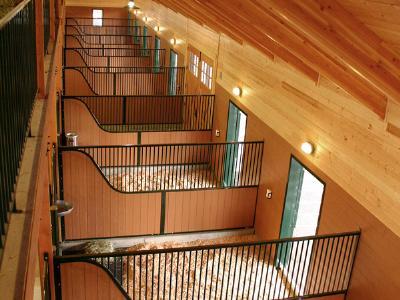Keeping Your Stalls Clean and Your Horses Healthy

It’s finally fall and a perfect time to step up your cleaning regimen in the stable. As your horses begin to spend more time indoors their health is dependent on their stall’s cleanliness. We’ve targeted 3 key areas to minimize health risks for your horses and stable.
Housekeeping
Muck twice a day. Staying on top of waste in your stalls, reduces chances of bacteria growth in the air your horse breaths and reduces the risk of infection. Clean bedding by removing soiled pieces and replacing with new. Scan for safety hazards regularly, including any open nails, bucket handles or other items near the floor that your horse could step on or get tangled in, and anything up high that could easily fall and injure your horse. Sweep and disinfect mats weekly to minimize bacteria growth.
Barn Ventilation and Stall Deodorizers
Ventilation and stall deodorizers not only make a stall’s smell less invasive, they also reduce the risk of respiratory issues in your horses. Ammonia levels found in a horse’s urine spreads bacteria and potent gases into the air you and your horse breathes. Neutralize the smell and bacteria, by sprinking odor absorbers like Stall DRY onto wet areas and remove wet spots daily. There are a number of deodorizes and home remedies available, doing your research will provide you with a solution that fits your horse’s environment and your budget. Proper ventilation is also key to reducing pathogens in the air. Replace stale air with fresh whenever possible.
Water and Feed
Keep food and water off the ground and away from bacteria. When your horse’s feed is low to the ground it’s closer to their waste, mud and germs brought in from outdoors and can easily become laden with contaminants. By keeping food and water up higher, you reduce the risk of other materials mixing in and affecting their nutrition. If your horse has a tendancy to spill buckets or splash water, try installing wall-mounted feeders and waterers to stabilze your horse’s food source and reduce loss. Providing fresh food and water while maintaining clean containers should also be done often.
Seems like fairly common practice, right? Here are a few reasons why it’s important to stay on top of this:
Laying in soiled bedding can increase chances of thrush, fungal diseases, respiratory issues and skin infections among others.
Amonia levels over time from your horse’s urine cause respiratory problems that can lead to pneumonia, heaves and a higher susceptibility to pathogens. Young foals are even more susceptible to these issues as they are closer to the fumes and do not have fully developed respiratory systems.
Poor food and water preservation can introduce parasites, intestinal bacteria, and materials that are difficult for your horse to digest into their systems and can lead to issues like colic.
These three key areas will greatly help in maintaining your horse’s health. So remember, a healthy horse is a happy horse — keep your stalls clean and your horses healthy.
Related news
 Raising Livestock: Keeping your livestock cool this summer
Raising Livestock: Keeping your livestock cool this summer For stock that can be haltered, pamper them. Baths can be so cooling, however, that you have to be careful not to send your animals into temperature shock.
 Are Your Livestock Drinking Enough Water?
Are Your Livestock Drinking Enough Water? Water is essential to the life of all livestock and is important to continually replenish. Water aids in the digestion of feed, milk production, performance.
 Horse Health: Hydrating Your Horse after Running or Racing
Horse Health: Hydrating Your Horse after Running or Racing It is important to properly cool down your horse after a hard workout such as jumping or racing. Like all athletes, horses need to cool down to avoid getting...